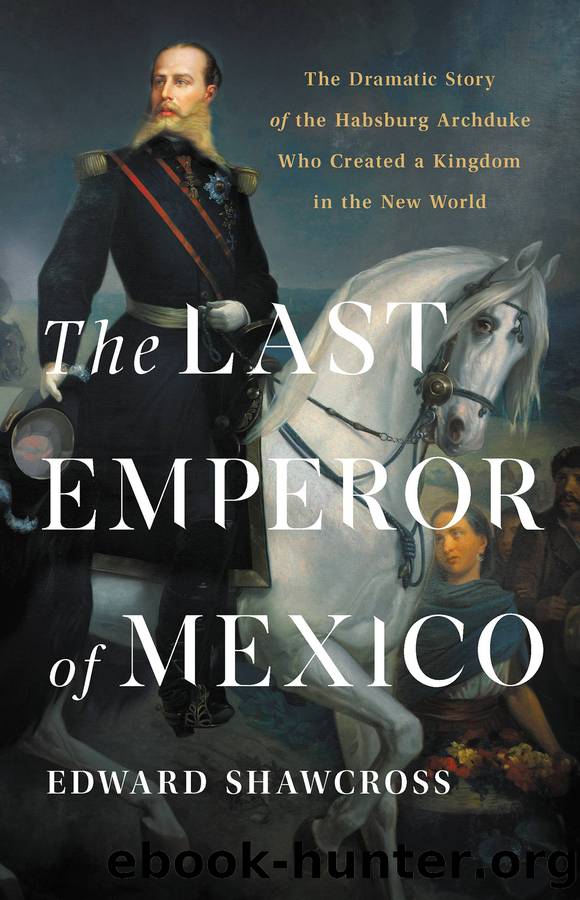The Last Emperor of Mexico: The Dramatic Story of the Habsburg Archduke Who Created a Kingdom in the New World by Edward Shawcross

Author:Edward Shawcross [Shawcross, Edward]
Language: eng
Format: epub
Tags: history, Latin America, Central America, Europe, France, United States, Civil War Period (1850-1877)
ISBN: 9781541674196
Google: UeMxzgEACAAJ
Publisher: Basic Books
Published: 2021-11-15T23:45:32.420915+00:00
AS MAXIMILIAN AND Napoleon III both knew, the great obstacle to the Mexican empire was the United States. In March 1865, Napoleon III had comforted Maximilian with the analysis that the American Civil War would last a long time yet. By the time this letter reached Mexico, the Confederate armies had surrendered. The Mexican empire was a monumental gamble, dependent upon the conflict north of the border. Weakened by years of fighting, or perhaps divided in two, the United States would recognise the Mexican empire, ending Juárezâs lifeline.
At enormous cost, however, the Union had emerged from the conflict not only victorious but more powerful than ever, with a veteran army larger than at any point in previous US history. Moreover, bellicose Union generals, now popular war heroes, notably Ulysses S. Grant, were keen to use this army to uphold the Monroe Doctrine and US supremacy in the Americas. For men like Grant, Maximilianâs empire represented a nightmarish mix of papal conspiracy and monarchical European power that, in league with the Confederacy, challenged republican democracy. If war were necessary to end Maximilianâs rule, reasoned Grant, then so be it.
Throughout the American Civil War, Lincoln and Seward had been a restraining influence, combining a strategy of nonintervention while refusing to recognise Maximilianâs government; however, Lincolnâs assassination less than a week after the end of the war jeopardised this position. There was wild speculation that the new president, Andrew Johnson, would bow to pressure from his generals and invade Mexico.
As was so often the case when major news broke, Maximilian was away touring his kingdom as word of the Confederate defeat reached Mexico City. The news electrified the capital, emboldening the empireâs enemies. Carlota, acting as regent, was, therefore, rather ungracious when she heard of Lincolnâs murder, seemingly unaware that he had been a calming influence on US policy towards the empire. âHere the mood is excellent since the death of Lincoln, the head of demagoguery in America; it is as if the reds [Juaristas] are struck by lightning and they attribute it to your good fortuneâ. Carlota loathed the United States, her piety fusing with her burgeoning Mexican nationalism. She saw Mexicoâs neighbour as a nation bereft of religion, principles, and liberty. The Civil War was a consequence of this degradation, she argued: âSoon a million men will have perished, immolated in a holocaust to their improvidence and evil passions.â29 She believed that the United States was intent on further expansion at Mexicoâs expense and would replace Catholicism with Protestantism. Stopping this, she felt, was a holy war. Still, she was pragmatic, and, hoping Lincolnâs death would lead to Johnson recognising the empire, she wrote letters of condolence to Lincolnâs wife and the new president.
In the following weeks, imperialistas scanned the US press for any sign of Johnsonâs plan. Early indications were encouraging, Seward continued his policy of neutrality, and Maximilian could not understand why the secretary of state persisted in not recognising his government. Traditionally, Washington diplomatically acknowledged whatever regime held the capital.
Download
This site does not store any files on its server. We only index and link to content provided by other sites. Please contact the content providers to delete copyright contents if any and email us, we'll remove relevant links or contents immediately.
Machine Learning at Scale with H2O by Gregory Keys | David Whiting(4295)
Never by Ken Follett(3937)
Harry Potter and the Goblet Of Fire by J.K. Rowling(3848)
Unfinished: A Memoir by Priyanka Chopra Jonas(3382)
Fairy Tale by Stephen King(3370)
The Man Who Died Twice by Richard Osman(3072)
Will by Will Smith(2911)
Rationality by Steven Pinker(2352)
It Starts With Us (It Ends with Us #2) by Colleen Hoover(2345)
Can't Hurt Me: Master Your Mind and Defy the Odds - Clean Edition by David Goggins(2324)
The Dark Hours by Michael Connelly(2300)
The Storyteller by Dave Grohl(2229)
Friends, Lovers, and the Big Terrible Thing by Matthew Perry(2219)
The Dawn of Everything: A New History of Humanity by David Graeber & David Wengrow(2197)
The Becoming by Nora Roberts(2189)
The Stranger in the Lifeboat by Mitch Albom(2113)
Cloud Cuckoo Land by Anthony Doerr(2104)
Love on the Brain by Ali Hazelwood(2062)
Einstein: His Life and Universe by Walter Isaacson(2012)
